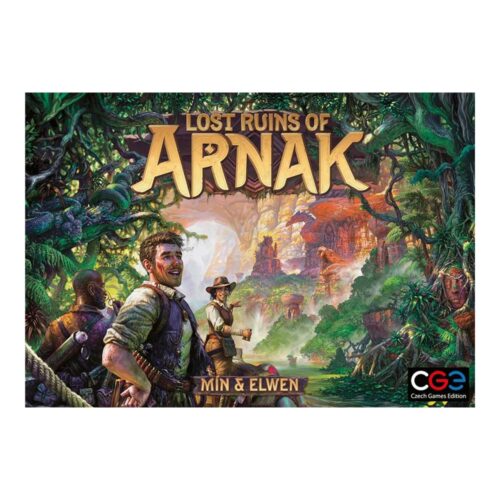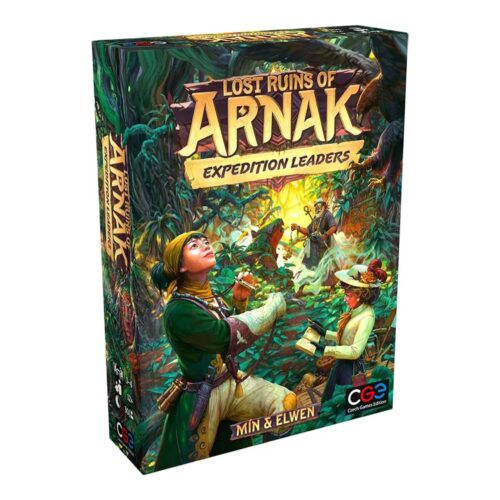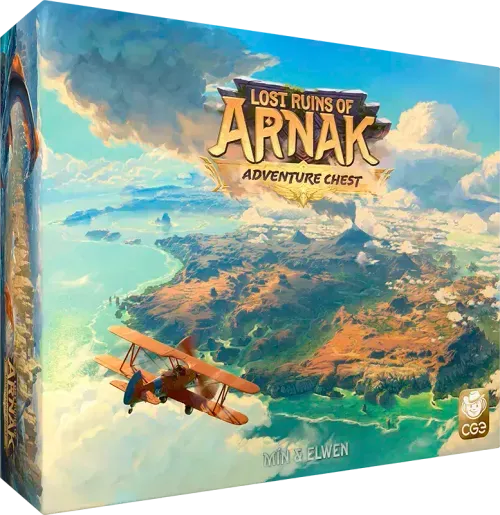 The adventure is calling to you once again—and this time, you don’t have to worry about packing light! /n/nMeet the Adventure Chest—a brand-new expansion to Lost Ruins of Arnak that features an original storage solution designed by CGE and fits all previously released Lost Ruins of Arnak content. The Adventure Chest box is bigger and sturdier than that of the base game—and it still fits into a certain board-gamer-favorite Swedish-made shelf! The insert itself is made of 8 individual boxes from layered PET material and is designed to make setup, play, and cleanup as easy as possible. /n/nInside the “Adventure Chest”, we’ve included a fresh addition to the world of Arnak, the new expansion “Twisted Paths”. This expansion brings a new double-sided map bigger than the one in the base game and includes two new research tracks, each with unique mechanisms and components (like brand new temple tiles or new resources—dark tablets). /n/nIn addition to new maps, the expansion contains new guardians, sites, and assistants, and also some solo content—Rival tiles for the new maps, as well as Purple Rival tiles and Rival Objectives, two mini expansions we’ve previously released online as print-and-play. /n/nThe “Adventure Chest” does NOT include any other Lost Ruins of Arnak content. The base game or any of the two previous expansions, Expedition Leaders or The Missing Expedition, must be purchased separately.
The adventure is calling to you once again—and this time, you don’t have to worry about packing light! /n/nMeet the Adventure Chest—a brand-new expansion to Lost Ruins of Arnak that features an original storage solution designed by CGE and fits all previously released Lost Ruins of Arnak content. The Adventure Chest box is bigger and sturdier than that of the base game—and it still fits into a certain board-gamer-favorite Swedish-made shelf! The insert itself is made of 8 individual boxes from layered PET material and is designed to make setup, play, and cleanup as easy as possible. /n/nInside the “Adventure Chest”, we’ve included a fresh addition to the world of Arnak, the new expansion “Twisted Paths”. This expansion brings a new double-sided map bigger than the one in the base game and includes two new research tracks, each with unique mechanisms and components (like brand new temple tiles or new resources—dark tablets). /n/nIn addition to new maps, the expansion contains new guardians, sites, and assistants, and also some solo content—Rival tiles for the new maps, as well as Purple Rival tiles and Rival Objectives, two mini expansions we’ve previously released online as print-and-play. /n/nThe “Adventure Chest” does NOT include any other Lost Ruins of Arnak content. The base game or any of the two previous expansions, Expedition Leaders or The Missing Expedition, must be purchased separately.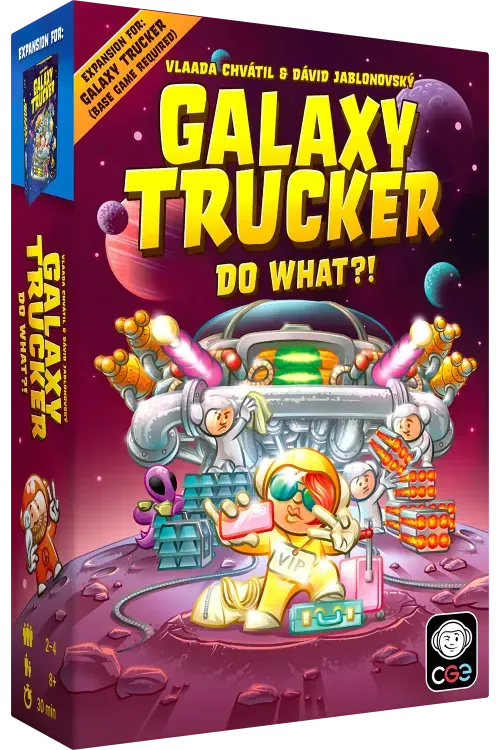 Are you a fearless trailblazer or perhaps a complete daredevil? If so, Corp Incorporated invites you to... Do What?! More trucking! /n/nYou’ll get the chance to undertake Missions that might—quite literally—blow your mind. Escort aliens with special powers, build crazy ships beyond human imagination, place bets, and laugh in the face of danger. Win the annual Transgalactic Trek—the most prestigious trucking achievement in the known universe—and join Club Gold! Or at least cross the finish line on a toilet seat, but alive. /n/nIf hauling boombastic or suspiciously glowing cargo isn’t wild enough, take it up a notch with some Supercards! After all, what’s a galactic mission without a good old Meteor Shower, eh? /n/nWe all know how important connections are in life. On your adventures, you’ll meet many high-profile VIPs and even have the opportunity to earn some serious cash by becoming their space taxi driver! Some of the prominent passengers just want to have fun, even if it means smuggling goods in pipes, boosting weapons, or flying away with a part of your ship! /n/nP.S. Having quality life insurance is highly recommended—just in case. Galaxy Trucker: Do What?! is the second expansion for the new edition of Galaxy Trucker, offering even more opportunities to gain riches and new ways to destroy your run-down ship. This expansion features two big modules for seasoned truckers: Missions and VIP Astronauts, and a Turn-Based Mode for a more laid-back experience. /n/nRequires the Galaxy Trucker base game (new ed.), compatible with Galaxy Trucker: Keep on Trucking.
Are you a fearless trailblazer or perhaps a complete daredevil? If so, Corp Incorporated invites you to... Do What?! More trucking! /n/nYou’ll get the chance to undertake Missions that might—quite literally—blow your mind. Escort aliens with special powers, build crazy ships beyond human imagination, place bets, and laugh in the face of danger. Win the annual Transgalactic Trek—the most prestigious trucking achievement in the known universe—and join Club Gold! Or at least cross the finish line on a toilet seat, but alive. /n/nIf hauling boombastic or suspiciously glowing cargo isn’t wild enough, take it up a notch with some Supercards! After all, what’s a galactic mission without a good old Meteor Shower, eh? /n/nWe all know how important connections are in life. On your adventures, you’ll meet many high-profile VIPs and even have the opportunity to earn some serious cash by becoming their space taxi driver! Some of the prominent passengers just want to have fun, even if it means smuggling goods in pipes, boosting weapons, or flying away with a part of your ship! /n/nP.S. Having quality life insurance is highly recommended—just in case. Galaxy Trucker: Do What?! is the second expansion for the new edition of Galaxy Trucker, offering even more opportunities to gain riches and new ways to destroy your run-down ship. This expansion features two big modules for seasoned truckers: Missions and VIP Astronauts, and a Turn-Based Mode for a more laid-back experience. /n/nRequires the Galaxy Trucker base game (new ed.), compatible with Galaxy Trucker: Keep on Trucking.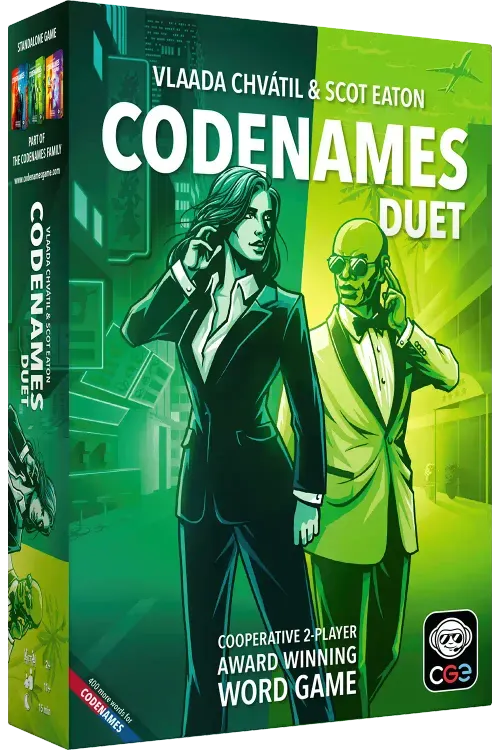 We put a cooperative spin on the classic game! Now with a revised word list, beautiful art, a brand-new insert that keeps your game neatly organized, and a streamlined rulebook that makes it easier to teach and learn the game. /n/nIn Codenames Duet, you're no longer competing — you're teaming up with a fellow operative (or operatives in a group game) for an exciting cooperative experience. The mission? Work together to find all your secret agents hidden among a grid of mysterious codenames. The twist? You each see part of the key — and neither of you has the full picture. Codenames: Duet is perfect to enjoy with only two players, but you can also play it with more friends, if you'd like a less competitive experience than in the basic Codenames. /n/nHere’s how the game works: Lay out 25 word cards in a 5×5 grid. Between you is a shared key card — each half of the team sees one side. On your side, nine words mark your agents, three mark deadly assassins, and the rest are innocent bystanders. /n/nYou’ll take turns giving one-word clues paired with a number, pointing the operative(s) across from you to specific words on the grid. Guess right? Keep going. Guess a bystander? Your turn ends. Guess an assassin? Mission failed — game over. But as long as your guesses are correct, you can keep going, even revisiting past clues. /n/nThe game is played over a series of 9 turns, but can be increased to 11 turns for operatives who may need a little more time as they improve their skills.Your goal: Find all 15 agents — without triggering an assassin — before you run out of time! /n/nThe game includes 400 new words that can be combined with those from standard Codenames.
We put a cooperative spin on the classic game! Now with a revised word list, beautiful art, a brand-new insert that keeps your game neatly organized, and a streamlined rulebook that makes it easier to teach and learn the game. /n/nIn Codenames Duet, you're no longer competing — you're teaming up with a fellow operative (or operatives in a group game) for an exciting cooperative experience. The mission? Work together to find all your secret agents hidden among a grid of mysterious codenames. The twist? You each see part of the key — and neither of you has the full picture. Codenames: Duet is perfect to enjoy with only two players, but you can also play it with more friends, if you'd like a less competitive experience than in the basic Codenames. /n/nHere’s how the game works: Lay out 25 word cards in a 5×5 grid. Between you is a shared key card — each half of the team sees one side. On your side, nine words mark your agents, three mark deadly assassins, and the rest are innocent bystanders. /n/nYou’ll take turns giving one-word clues paired with a number, pointing the operative(s) across from you to specific words on the grid. Guess right? Keep going. Guess a bystander? Your turn ends. Guess an assassin? Mission failed — game over. But as long as your guesses are correct, you can keep going, even revisiting past clues. /n/nThe game is played over a series of 9 turns, but can be increased to 11 turns for operatives who may need a little more time as they improve their skills.Your goal: Find all 15 agents — without triggering an assassin — before you run out of time! /n/nThe game includes 400 new words that can be combined with those from standard Codenames.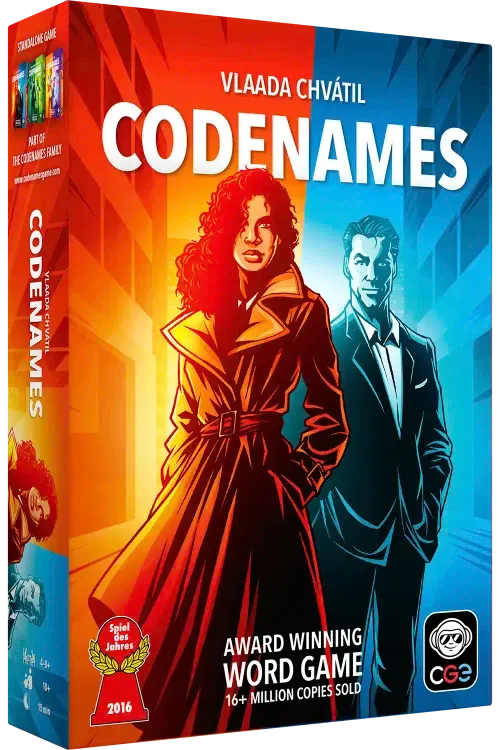 The new edition of Codenames refreshes the classic experience players know and love. From a revised word list for improved gameplay, beautiful art, a brand-new insert that keeps your game neatly organized, to a streamlined rulebook that makes the game easier to teach and learn, this updated version is designed to delight longtime fans of the game and welcome new ones. /n/nIn Codenames, two rival spymasters know the secret identities of 25 agents. Their teammates, however, only know these agents by their codenames — single, seemingly random words like “chocolate,” “sunflower,” or even “carrot.” (Yes, there's an agent out there codenamed "carrot.") The goal is simple: each spymaster wants their team to identify all of their agents first, without accidentally revealing the assassin. /n/nTo play, lay out 25 cards, each featuring a single word. The spymasters share a key card that shows which words correspond to agents from each team, innocent bystanders, and the assassin. They then take turns giving one-word clues followed by a number. The clue should relate to multiple cards that their team should guess, and the number tells teammates how many cards are linked to that clue/n/n.Teammates guess one card at a time. If they guess correctly, they can keep going. But if they pick a card belonging to the opposing team or an innocent bystander, their turn ends. And if they choose the assassin? Game over. /n/nPlay continues with each spymaster offering new clues until one team successfully identifies all of their agents — or someone tragically uncovers the assassin. /n/nGet ready for clever clues, bold guesses, and the ultimate race to uncover your team’s secret agents — Codenames makes every game night unforgettable!
The new edition of Codenames refreshes the classic experience players know and love. From a revised word list for improved gameplay, beautiful art, a brand-new insert that keeps your game neatly organized, to a streamlined rulebook that makes the game easier to teach and learn, this updated version is designed to delight longtime fans of the game and welcome new ones. /n/nIn Codenames, two rival spymasters know the secret identities of 25 agents. Their teammates, however, only know these agents by their codenames — single, seemingly random words like “chocolate,” “sunflower,” or even “carrot.” (Yes, there's an agent out there codenamed "carrot.") The goal is simple: each spymaster wants their team to identify all of their agents first, without accidentally revealing the assassin. /n/nTo play, lay out 25 cards, each featuring a single word. The spymasters share a key card that shows which words correspond to agents from each team, innocent bystanders, and the assassin. They then take turns giving one-word clues followed by a number. The clue should relate to multiple cards that their team should guess, and the number tells teammates how many cards are linked to that clue/n/n.Teammates guess one card at a time. If they guess correctly, they can keep going. But if they pick a card belonging to the opposing team or an innocent bystander, their turn ends. And if they choose the assassin? Game over. /n/nPlay continues with each spymaster offering new clues until one team successfully identifies all of their agents — or someone tragically uncovers the assassin. /n/nGet ready for clever clues, bold guesses, and the ultimate race to uncover your team’s secret agents — Codenames makes every game night unforgettable!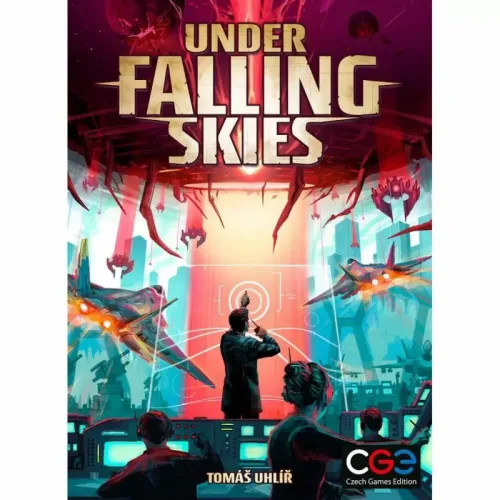 Under Falling Skies is a solo game with a multi-mission campaign. In each mission, you take charge of defending a besieged city. Your actions are powered by an innovative dice placement mechanic. When you choose an action, you are also choosing which enemy ships will descend. Bigger numbers give better effects, but they also cause ships to descend faster. Expand your underground base to gain access to more powerful actions, allowing you to shoot down enemy ships or deploy robots to increase your workforce, but don't forget to work on your research and watch your energy supply. The mothership draws closer every round, ratcheting up the tension. Can you complete your mission before your base is destroyed?
Under Falling Skies is a solo game with a multi-mission campaign. In each mission, you take charge of defending a besieged city. Your actions are powered by an innovative dice placement mechanic. When you choose an action, you are also choosing which enemy ships will descend. Bigger numbers give better effects, but they also cause ships to descend faster. Expand your underground base to gain access to more powerful actions, allowing you to shoot down enemy ships or deploy robots to increase your workforce, but don't forget to work on your research and watch your energy supply. The mothership draws closer every round, ratcheting up the tension. Can you complete your mission before your base is destroyed?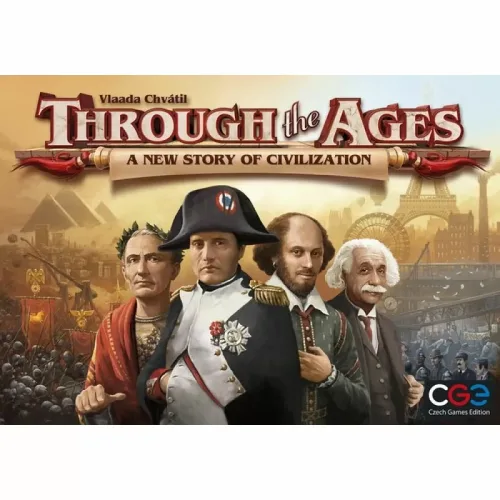 Through the Ages: A New Story of Civilization is the new edition of Through the Ages: A Story of Civilization, with many changes small and large to the game's cards over its three ages and extensive changes to how military works. Through the Ages is a civilization building game. Each player attempts to build the best civilization through careful resource management, discovering new technologies, electing the right leaders, building wonders and maintaining a strong military. Weakness in any area can be exploited by your opponents. The game takes place throughout the ages beginning in the age of antiquity and ending in the modern age. One of the primary mechanisms in TTA is card drafting. Technologies, wonders, and leaders come into play and become easier to draft the longer they are in play. In order to use a technology you will need enough science to discover it, enough food to create a population to man it and enough resources (ore) to build the building to use it. While balancing the resources needed to advance your technology you also need to build a military. Military is built in the same way as civilian buildings. Players that have a weak military will be preyed upon by other players. There is no map in the game so you cannot lose territory, but players with higher military will steal resources, science, kill leaders, take population or culture. It is very difficult to win with a large military, but it is very easy to lose because of a weak one. Victory is achieved by the player whose nation has the most culture at the end of the modern age.
Through the Ages: A New Story of Civilization is the new edition of Through the Ages: A Story of Civilization, with many changes small and large to the game's cards over its three ages and extensive changes to how military works. Through the Ages is a civilization building game. Each player attempts to build the best civilization through careful resource management, discovering new technologies, electing the right leaders, building wonders and maintaining a strong military. Weakness in any area can be exploited by your opponents. The game takes place throughout the ages beginning in the age of antiquity and ending in the modern age. One of the primary mechanisms in TTA is card drafting. Technologies, wonders, and leaders come into play and become easier to draft the longer they are in play. In order to use a technology you will need enough science to discover it, enough food to create a population to man it and enough resources (ore) to build the building to use it. While balancing the resources needed to advance your technology you also need to build a military. Military is built in the same way as civilian buildings. Players that have a weak military will be preyed upon by other players. There is no map in the game so you cannot lose territory, but players with higher military will steal resources, science, kill leaders, take population or culture. It is very difficult to win with a large military, but it is very easy to lose because of a weak one. Victory is achieved by the player whose nation has the most culture at the end of the modern age.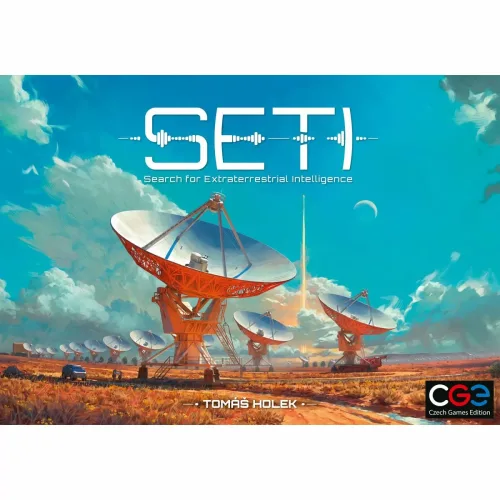 In SETI: Search for Extraterrestrial Intelligence, a eurogame for 1–4 players, you lead a scientific institution tasked with searching for traces of life beyond planet Earth. The game draws inspiration from current or emerging technologies and efforts in space exploration. Players will explore nearby planets and their moons by launching probes from Earth while taking advantage of ever-shifting planetary positions. Decide whether to land on their surface to collect valuable samples, or stay in orbit for a broader survey. Additionally, by directing your telescopes to gaze into distant star systems, you may detect traces of alien signals or undiscovered exoplanets, and collect promising data to examine and study back home. Back on Earth, you can invest in upgrading your equipment so you can analyze incoming data more efficiently, boost your telescope signal capacity, or increase your supply of resources—all to expand the scope of your search that could lead to a discovery of extraterrestrial life forms. You will also make use of over 200 cards to aid your efforts or focus your research in a particular direction for additional bonuses and rewards. Each card has a unique effect and illustration, and depicts real-life technologies, projects, and discoveries (like the ISS, Large Hadron Collider, Perseverance rover, Voyager probe, and many more). Finding traces of extraterrestrial life is only a matter of time—utilize the resources you have at your disposal strategically and you may well end up being the one to make the biggest scientific contribution towards advancing our understanding of alien life within our galaxy.
In SETI: Search for Extraterrestrial Intelligence, a eurogame for 1–4 players, you lead a scientific institution tasked with searching for traces of life beyond planet Earth. The game draws inspiration from current or emerging technologies and efforts in space exploration. Players will explore nearby planets and their moons by launching probes from Earth while taking advantage of ever-shifting planetary positions. Decide whether to land on their surface to collect valuable samples, or stay in orbit for a broader survey. Additionally, by directing your telescopes to gaze into distant star systems, you may detect traces of alien signals or undiscovered exoplanets, and collect promising data to examine and study back home. Back on Earth, you can invest in upgrading your equipment so you can analyze incoming data more efficiently, boost your telescope signal capacity, or increase your supply of resources—all to expand the scope of your search that could lead to a discovery of extraterrestrial life forms. You will also make use of over 200 cards to aid your efforts or focus your research in a particular direction for additional bonuses and rewards. Each card has a unique effect and illustration, and depicts real-life technologies, projects, and discoveries (like the ISS, Large Hadron Collider, Perseverance rover, Voyager probe, and many more). Finding traces of extraterrestrial life is only a matter of time—utilize the resources you have at your disposal strategically and you may well end up being the one to make the biggest scientific contribution towards advancing our understanding of alien life within our galaxy.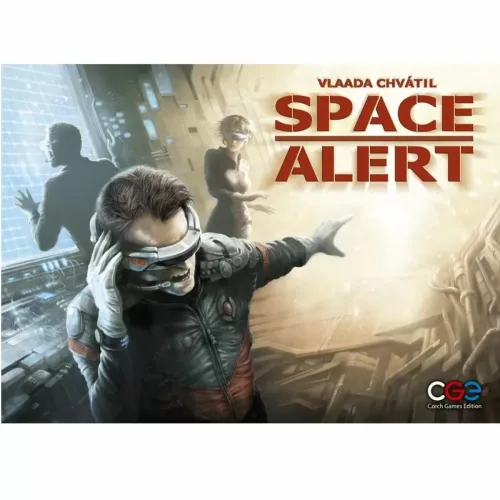 Space Alert is a cooperative team survival game. Players become crew members of a small spaceship scanning dangerous sectors of the galaxy. The missions last just 10 real-time minutes (hyperspace jump, sector scan, hyperspace jump back) and the only task the players have is to protect their ship. During play, the central computer will announce the presence of various threats on one of the supplied 10 minute soundtracks that also acts as a game timer. The threats vary from space battleships and interceptors to different interstellar monsters and abominations, asteroids or even intruders and malfunctions on the spaceship. Players have to agree who will take care of which task and coordinate their actions (moving around the ship, firing weapons, distributing energy, using battlebots to deal with intruders, launching guided missiles, etc.) in real time to defend the ship. Only a well-working team can survive 10 minutes and make the jump back to safety. The game offers several difficulty levels, huge variability and a unique experience for one to five player teams. One mission lasts only about 30 minutes, including setup and evaluation.
Space Alert is a cooperative team survival game. Players become crew members of a small spaceship scanning dangerous sectors of the galaxy. The missions last just 10 real-time minutes (hyperspace jump, sector scan, hyperspace jump back) and the only task the players have is to protect their ship. During play, the central computer will announce the presence of various threats on one of the supplied 10 minute soundtracks that also acts as a game timer. The threats vary from space battleships and interceptors to different interstellar monsters and abominations, asteroids or even intruders and malfunctions on the spaceship. Players have to agree who will take care of which task and coordinate their actions (moving around the ship, firing weapons, distributing energy, using battlebots to deal with intruders, launching guided missiles, etc.) in real time to defend the ship. Only a well-working team can survive 10 minutes and make the jump back to safety. The game offers several difficulty levels, huge variability and a unique experience for one to five player teams. One mission lasts only about 30 minutes, including setup and evaluation.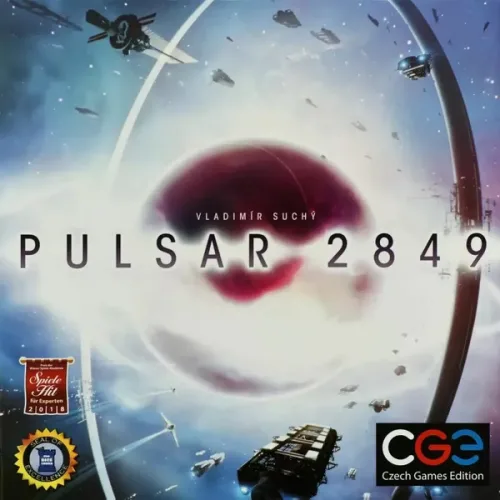 It is the year 2849, and humanity has harnessed the power of the pulsars. Now we must find a way to distribute this power throughout the stars. In this Euro-style game, players explore space, claim pulsars, and discover technologies that will help them build energy-distribution infrastructure on a cosmic scale. Dice are used to purchase actions, and players choose their dice from a communal pool. There are many paths to victory so you can blaze your own trail to a bright future. Draft dice to explore the universe in Pulsar 2849. Game is only 8 rounds long. Each round, roll dice based on the number of players, sort them based on their values, then draft dice to take actions. Possible actions □ Fly your survey ship □ take a Gyrodyne □ Develop a Pulsar □ Build one or more energy transmitter vectors □ Patent a technology □ Buy a dice modifier □ Complete a special project in your HQ and unlock Gate Run Players score points each round based on what they've discovered and explored, and everyone has common goals that they want to achieve.
It is the year 2849, and humanity has harnessed the power of the pulsars. Now we must find a way to distribute this power throughout the stars. In this Euro-style game, players explore space, claim pulsars, and discover technologies that will help them build energy-distribution infrastructure on a cosmic scale. Dice are used to purchase actions, and players choose their dice from a communal pool. There are many paths to victory so you can blaze your own trail to a bright future. Draft dice to explore the universe in Pulsar 2849. Game is only 8 rounds long. Each round, roll dice based on the number of players, sort them based on their values, then draft dice to take actions. Possible actions □ Fly your survey ship □ take a Gyrodyne □ Develop a Pulsar □ Build one or more energy transmitter vectors □ Patent a technology □ Buy a dice modifier □ Complete a special project in your HQ and unlock Gate Run Players score points each round based on what they've discovered and explored, and everyone has common goals that they want to achieve.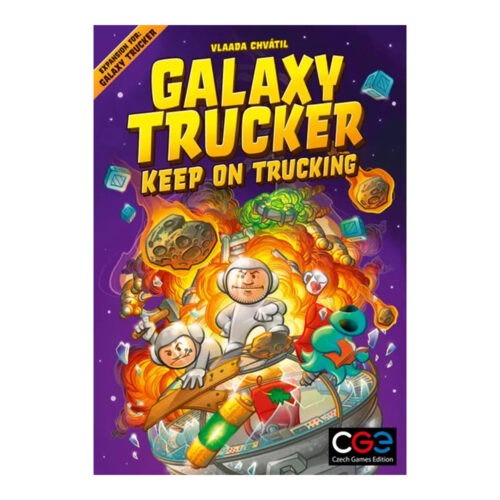 Do you laugh at pirates, shrug off combat zones, and meet every meteor with cannons blazing? If you've mastered the basics of Galaxy Trucker, then you're ready for this expansion! Corp Inc has new ships they would like you to try. Ships that will challenge you. Ships that will make you ask, "What were they thinking?!" Your ships will be thoroughly tested by new adventures. And if your flights still seem easy, Rough Roads cards can turn a humdrum milk run into a twisted spatiotemporal nightmare. To meet these challenges, you'll have access to new components offering new tactical options. And you'll be able to fly with new aliens who each have a unique ability. The different parts of the expansion can be mixed and matched, allowing you to choose the combination that will be most fun for you. So whether you're flying with grizzled veterans who miss the thrill of exploding space ships, or teaching newbies who just survived their first flight, this expansion will help you Keep on Trucking! Author: Vlaada Chvatil Players: 2-4 Age: 8+ Time: 30 min Theme: Build a space ship and fly it across the Galaxy. Deliver goods for a profit ... if the pirates and meteors don't blast your ship apart. Mechanics: Players simultaneously build space ships out of tiles, which they grab as fast as they can.
Do you laugh at pirates, shrug off combat zones, and meet every meteor with cannons blazing? If you've mastered the basics of Galaxy Trucker, then you're ready for this expansion! Corp Inc has new ships they would like you to try. Ships that will challenge you. Ships that will make you ask, "What were they thinking?!" Your ships will be thoroughly tested by new adventures. And if your flights still seem easy, Rough Roads cards can turn a humdrum milk run into a twisted spatiotemporal nightmare. To meet these challenges, you'll have access to new components offering new tactical options. And you'll be able to fly with new aliens who each have a unique ability. The different parts of the expansion can be mixed and matched, allowing you to choose the combination that will be most fun for you. So whether you're flying with grizzled veterans who miss the thrill of exploding space ships, or teaching newbies who just survived their first flight, this expansion will help you Keep on Trucking! Author: Vlaada Chvatil Players: 2-4 Age: 8+ Time: 30 min Theme: Build a space ship and fly it across the Galaxy. Deliver goods for a profit ... if the pirates and meteors don't blast your ship apart. Mechanics: Players simultaneously build space ships out of tiles, which they grab as fast as they can.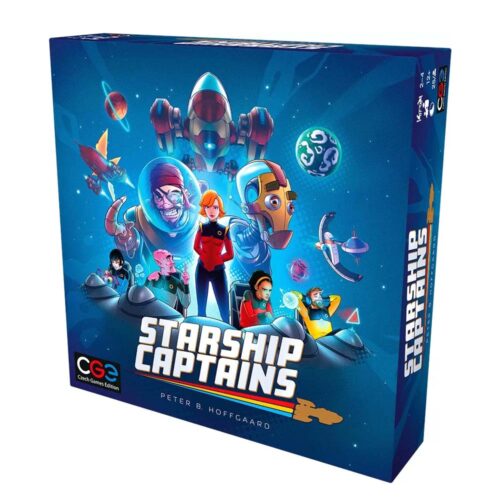 Hailing all Starship Captains! Get ready to embark on a maiden voyage through the cosmos in this euro-style action selection and engine building game for 2-4 players. • Manage a diverse crew of cadets, ensigns, androids, and officers—each with different special roles and capabilities. • Earn medals to promote and train your crew for even greater effectiveness. • Explore an ever-shifting galaxy full of dangerous pirates and interplanetary missions. • Upgrade your ship with powerful engine building technology for maximum synergy. • Boost your reputation with three distinct galactic factions for bountiful rewards. Explore a galaxy full of dangerous pirates and interplanetary missions, as you manage, train, and promote your crew to improve their diverse skills. Then harness the power of cool alien technology to help your crew tackle goofy missions through the stars and beyond. Author: Peter B. Hoffgaard Players: 1-4 Age: 12+ Time: 25 mins / player Theme: Train your crew, upgrade your starship, and take on daring missions as a new starship captain in an ever-shifting galactic adventure.
Hailing all Starship Captains! Get ready to embark on a maiden voyage through the cosmos in this euro-style action selection and engine building game for 2-4 players. • Manage a diverse crew of cadets, ensigns, androids, and officers—each with different special roles and capabilities. • Earn medals to promote and train your crew for even greater effectiveness. • Explore an ever-shifting galaxy full of dangerous pirates and interplanetary missions. • Upgrade your ship with powerful engine building technology for maximum synergy. • Boost your reputation with three distinct galactic factions for bountiful rewards. Explore a galaxy full of dangerous pirates and interplanetary missions, as you manage, train, and promote your crew to improve their diverse skills. Then harness the power of cool alien technology to help your crew tackle goofy missions through the stars and beyond. Author: Peter B. Hoffgaard Players: 1-4 Age: 12+ Time: 25 mins / player Theme: Train your crew, upgrade your starship, and take on daring missions as a new starship captain in an ever-shifting galactic adventure.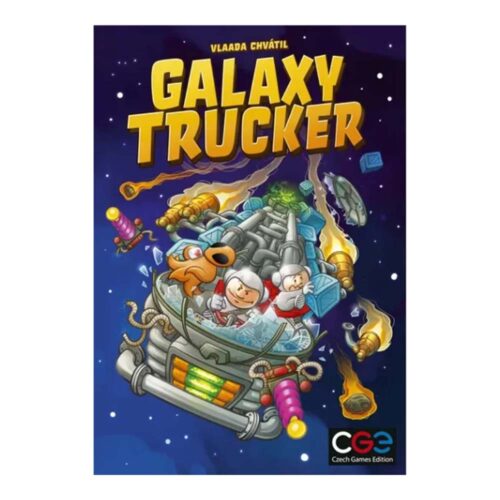 Once the ships are launched, players encounter dangerous situations while vying for financial opportunities, each hoping to gain the most valuable cargo and finish with as much of their ship still intact as possible. Of course, that's easier said than done since many hazards will send pieces of your ship, your cargo, and your crew hurling into the depths of space. The goal is to survive the trek — hopefully with at least some of your crew and ship intact — and have at least one credit by the end of the game. (Profit, yay!) Players earn credits by delivering goods, defeating pirates, having the best-looking ship, and reaching their destination before the others. This version of ''Galaxy Trucker'' is a relaunch of the original 2007 release by Vlaada Chvátil that features new art, more ship tiles, tweaked card effects, and streamlined gameplay that consists of only a single flight through space. That said, should you want a longer, more challenging experience, you can play a three-flight campaign known as the "Transgalactic Trek". Author: Vlaada Chvátil Year: Summer 2021 Players: 2-4 Age: 8+ Time: 30 min Theme: Build a space ship and fly it across the Galaxy. Deliver goods for a profit ... if the pirates and meteors don't blast your ship apart. Mechanics: Players simultaneously build space ships out of tiles, which they grab as fast as they can.
Once the ships are launched, players encounter dangerous situations while vying for financial opportunities, each hoping to gain the most valuable cargo and finish with as much of their ship still intact as possible. Of course, that's easier said than done since many hazards will send pieces of your ship, your cargo, and your crew hurling into the depths of space. The goal is to survive the trek — hopefully with at least some of your crew and ship intact — and have at least one credit by the end of the game. (Profit, yay!) Players earn credits by delivering goods, defeating pirates, having the best-looking ship, and reaching their destination before the others. This version of ''Galaxy Trucker'' is a relaunch of the original 2007 release by Vlaada Chvátil that features new art, more ship tiles, tweaked card effects, and streamlined gameplay that consists of only a single flight through space. That said, should you want a longer, more challenging experience, you can play a three-flight campaign known as the "Transgalactic Trek". Author: Vlaada Chvátil Year: Summer 2021 Players: 2-4 Age: 8+ Time: 30 min Theme: Build a space ship and fly it across the Galaxy. Deliver goods for a profit ... if the pirates and meteors don't blast your ship apart. Mechanics: Players simultaneously build space ships out of tiles, which they grab as fast as they can.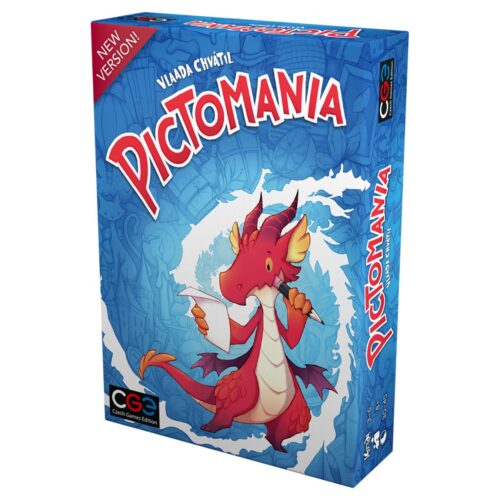 Is she drawing an elk or a moose? Is he drawing a pegasus or a unicorn? These are the types of questions you will probably be asking yourself during a game of Pictomania! There's no time to draw a complex masterpiece in Pictomania, the drawing game in which everybody draws and everybody guesses ? all at the same time! Players sketch the essence of the word with a few quick lines and try to guess the others' drawings while there's still time. This second edition of Pictomania features revised word cards with a brand new look. One big change for this edition compared to the base game is that only three word cards are in play no matter the player count, allowing you to jump into each round more quickly since you don't have to read as many words to guess who might be drawing what.
Is she drawing an elk or a moose? Is he drawing a pegasus or a unicorn? These are the types of questions you will probably be asking yourself during a game of Pictomania! There's no time to draw a complex masterpiece in Pictomania, the drawing game in which everybody draws and everybody guesses ? all at the same time! Players sketch the essence of the word with a few quick lines and try to guess the others' drawings while there's still time. This second edition of Pictomania features revised word cards with a brand new look. One big change for this edition compared to the base game is that only three word cards are in play no matter the player count, allowing you to jump into each round more quickly since you don't have to read as many words to guess who might be drawing what.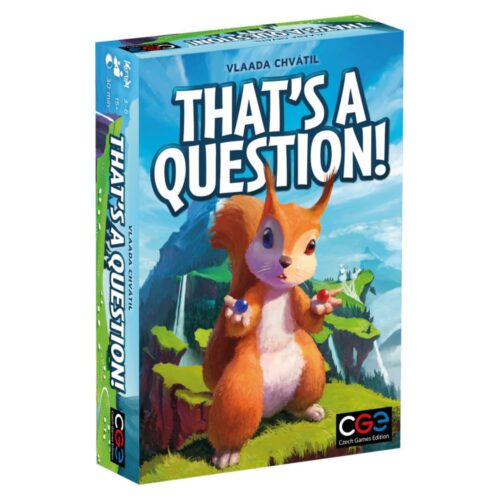 The party game That's a Question!, takes the familiar format of challenging others with questions, then voting on what they'll say. In more detail, each player has a hand of hexagonal cards, with words or phrases in three color blocks on the card. On a turn, you choose a player that has a token in front of them, take that token, then present them with a question by choosing one of the three question prompts (which are all color-coded), then choosing two cards from your hand and adding the properly-colored section of those cards to the question. A sample question: "What would you miss more if it ceases to exist: Facebook or doors?" That player secretly votes on A or B, while everyone else but the questioner secretly votes A or B depending on how they think the person will answer; a voter can optionally add their 3x scoring token to their vote. Once everyone votes, you reveal the tiles. Everyone who voted correctly moves ahead one or three spaces on the scoring track, and the questioner moves ahead one space for each person who voted incorrectly. If you pass a certain space on the scoring track, you retrieve your 3x token (if you've used it). Since you can ask a question only of those with a token in front of them, everyone is asked roughly the same number of questions, and whoever has the most points after a certain number of rounds wins.
The party game That's a Question!, takes the familiar format of challenging others with questions, then voting on what they'll say. In more detail, each player has a hand of hexagonal cards, with words or phrases in three color blocks on the card. On a turn, you choose a player that has a token in front of them, take that token, then present them with a question by choosing one of the three question prompts (which are all color-coded), then choosing two cards from your hand and adding the properly-colored section of those cards to the question. A sample question: "What would you miss more if it ceases to exist: Facebook or doors?" That player secretly votes on A or B, while everyone else but the questioner secretly votes A or B depending on how they think the person will answer; a voter can optionally add their 3x scoring token to their vote. Once everyone votes, you reveal the tiles. Everyone who voted correctly moves ahead one or three spaces on the scoring track, and the questioner moves ahead one space for each person who voted incorrectly. If you pass a certain space on the scoring track, you retrieve your 3x token (if you've used it). Since you can ask a question only of those with a token in front of them, everyone is asked roughly the same number of questions, and whoever has the most points after a certain number of rounds wins.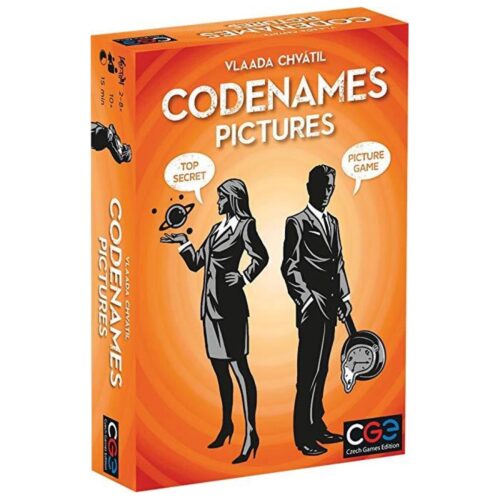 What are these strange symbols on the map? They are code for locations where spies must contact secret agents! Two rival spymasters know the agent in each location. They deliver coded messages telling their field operatives where to go for clandestine meetings. Operatives must be clever. A decoding mistake could lead to an unpleasant encounter with an enemy agent - or worse, with the assassin! Both teams race to contact all their agents, but only one team can win. Codenames: Pictures differs from the original Codenames in that the agents are no longer represented by a single word, but by an image that contains multiple elements.
What are these strange symbols on the map? They are code for locations where spies must contact secret agents! Two rival spymasters know the agent in each location. They deliver coded messages telling their field operatives where to go for clandestine meetings. Operatives must be clever. A decoding mistake could lead to an unpleasant encounter with an enemy agent - or worse, with the assassin! Both teams race to contact all their agents, but only one team can win. Codenames: Pictures differs from the original Codenames in that the agents are no longer represented by a single word, but by an image that contains multiple elements.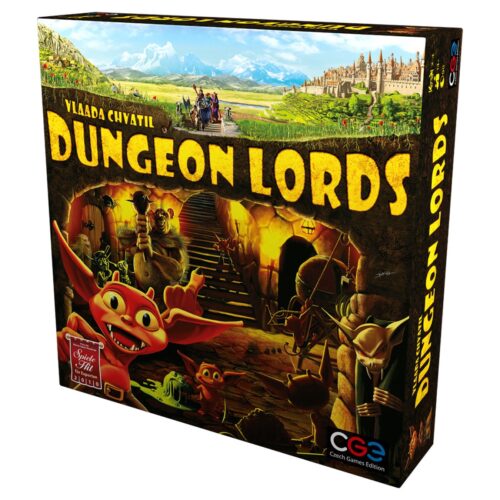 In Dungeon Lords, you are an evil dungeonlord who is trying to build the best dungeon out there. You hire monsters, build rooms, buy traps and defeat the do-gooders who wish to bring you down. Have you ever ventured with party of heroes to conquer dungeons, gain pride, experiences and of course rich treasure? And has it ever occurred to you how hard it actually is to build and manage such underground complex filled with corridors and creatures? No? Well now you can try. Put yourself in role of the master of underground, summon your servants, dig complex of tunnels and rooms, set traps, hire creatures and try to stop filthy heroes from conquering and plundering your precious creation. We can guarantee you will look on dark corners, lairs and their inhabitant from completely different perspective! Each turn, players use a hand of cards to choose where to place their worker. Actions vary from mining gold, hiring monsters, buying traps etc. Each action has three spots available - with each spot having different effects (e.g. mining gold lets you mine more gold in each spot). When using the cards, two cards will become locked and will not be able to be used next turn. There are 4 turns to place actions for each game "year" and two game years in a whole game. Each turn is identified as a "season". Each season, players will get to see the heroes and events to come in the following season. Thus allowing them to prepare. At the end of each season (after the first), heroes will be allocated to each player according to their level of evil. Heroes range from mighty heroes to sneaky thieves. Each hero has their own power for which the player needs to prepare for. Finally, at the end of each year, the heroes will travel down into the dungeon to fight. Scoring in the game is based upon what you have built, the monsters you have hired and the heroes you have captured.
In Dungeon Lords, you are an evil dungeonlord who is trying to build the best dungeon out there. You hire monsters, build rooms, buy traps and defeat the do-gooders who wish to bring you down. Have you ever ventured with party of heroes to conquer dungeons, gain pride, experiences and of course rich treasure? And has it ever occurred to you how hard it actually is to build and manage such underground complex filled with corridors and creatures? No? Well now you can try. Put yourself in role of the master of underground, summon your servants, dig complex of tunnels and rooms, set traps, hire creatures and try to stop filthy heroes from conquering and plundering your precious creation. We can guarantee you will look on dark corners, lairs and their inhabitant from completely different perspective! Each turn, players use a hand of cards to choose where to place their worker. Actions vary from mining gold, hiring monsters, buying traps etc. Each action has three spots available - with each spot having different effects (e.g. mining gold lets you mine more gold in each spot). When using the cards, two cards will become locked and will not be able to be used next turn. There are 4 turns to place actions for each game "year" and two game years in a whole game. Each turn is identified as a "season". Each season, players will get to see the heroes and events to come in the following season. Thus allowing them to prepare. At the end of each season (after the first), heroes will be allocated to each player according to their level of evil. Heroes range from mighty heroes to sneaky thieves. Each hero has their own power for which the player needs to prepare for. Finally, at the end of each year, the heroes will travel down into the dungeon to fight. Scoring in the game is based upon what you have built, the monsters you have hired and the heroes you have captured.


